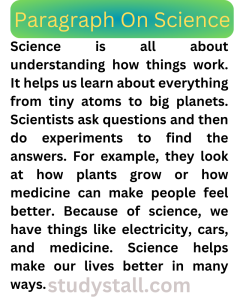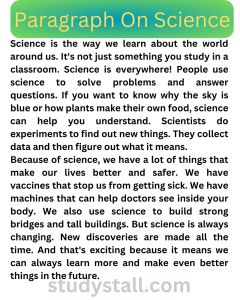Science is a vast and fascinating field that encompasses the study of the natural world, its phenomena, and the underlying principles that govern them. It plays a crucial role in our everyday lives, from the advancements in technology to the understanding of the universe. In this article, we will explore the various aspects of science and its significance in our society.
Paragraph On Science 100 words
Science is all about understanding how things work. It helps us learn about everything from tiny atoms to big planets. Scientists ask questions and then do experiments to find the answers. For example, they look at how plants grow or how medicine can make people feel better. Because of science, we have things like electricity, cars, and medicine. Science helps make our lives better in many ways.
Paragraph On Science 200 words
Science is the way we learn about the world around us. It’s not just something you study in a classroom. Science is everywhere! People use science to solve problems and answer questions. If you want to know why the sky is blue or how plants make their own food, science can help you understand. Scientists do experiments to find out new things. They collect data and then figure out what it means.
Because of science, we have a lot of things that make our lives better and safer. We have vaccines that stop us from getting sick. We have machines that can help doctors see inside your body. We also use science to build strong bridges and tall buildings. But science is always changing. New discoveries are made all the time. And that’s exciting because it means we can always learn more and make even better things in the future.
Paragraph On Science 300 words
Science is a way to discover new things and understand how the world works. When you think of science, you might think of people in white coats mixing chemicals, but it’s so much more than that. Science covers a lot of areas like biology, which studies living things; physics, which looks at energy and matter; and geology, which studies the Earth. Scientists ask questions and then try to find the answers through experiments or observation.
One of the coolest things about science is that it keeps helping us in real life. Think about how phones have changed because of advances in technology. Or how medicine has improved, so illnesses that were once deadly can now be treated. That’s all thanks to science!
However, science is not just about making gadgets or new medicine. It also helps us understand big questions, like how the universe started or why animals behave the way they do. Sometimes, science doesn’t have all the answers, but that’s okay. Not knowing something just gives scientists a new question to explore.
Science also helps kids in school learn important skills like problem-solving and critical thinking. When you learn how to do a science experiment, you’re not just learning facts; you’re learning how to think and figure things out for yourself. So, science isn’t just a subject in school or a job for scientists. It’s a way for all of us to ask questions, find answers, and make the world a better place to live.
Paragraph On Science 500 words
What is Science?
Science is a systematic and logical approach to understanding the world around us. It involves observing, questioning, experimenting, and analyzing to gather knowledge and explain natural phenomena. It aims to provide evidence-based explanations for how things work and predict future outcomes.
Importance of Science
Science holds immense importance in our lives due to its numerous contributions and impact. Here are some key reasons why science is crucial:
Advancements in Technology
Science has been at the forefront of technological advancements that have transformed the way we live. From the invention of electricity and the development of computers to the advent of the internet, these innovations have revolutionized various sectors and improved the quality of life for people worldwide.
Medical Breakthroughs
Science has played a pivotal role in improving healthcare and saving countless lives. Through scientific research, new medications, treatments, and surgical techniques have been developed to combat diseases and ailments. Vaccines, antibiotics, and medical imaging technologies are just a few examples of how science has revolutionized medicine.
Environmental Sustainability
With the growing concern for the environment, science plays a crucial role in understanding and finding solutions to environmental challenges. Through scientific studies, we can identify the causes of climate change, develop renewable energy sources, and implement sustainable practices to preserve our planet for future generations.
Understanding the Universe
Science has allowed us to explore and comprehend the vastness of our universe. From studying distant galaxies to unraveling the mysteries of black holes, our understanding of the cosmos has expanded significantly through scientific research and technological advancements, such as powerful telescopes and space probes.
Branches of Science
Science is a broad field that encompasses multiple branches, each focusing on different aspects of the natural world. Here are some major branches of science:
Physics
Physics is the study of matter, energy, and the fundamental forces that govern the universe. It explores topics such as motion, gravity, electricity, and quantum mechanics. Physics has led to groundbreaking discoveries like Einstein’s theory of relativity and the development of technologies like lasers and nuclear power.
Chemistry
Chemistry deals with the composition, properties, and behavior of matter. It examines the structure of atoms and molecules, chemical reactions, and the creation of new substances. Chemistry has contributed to various industries, including pharmaceuticals, materials science, and environmental conservation.
Biology
Biology focuses on the study of living organisms, including their structure, function, evolution, and interactions. It encompasses various sub-disciplines such as genetics, microbiology, ecology, and physiology. Biological research has led to advances in medicine, agriculture, and biotechnology.
Earth Sciences
Earth sciences involve the study of the Earth’s physical structure, composition, and processes. It includes disciplines like geology, meteorology, oceanography, and climatology. Earth scientists play a crucial role in understanding natural disasters, climate change, and the sustainable use of Earth’s resources.
Social Sciences
Social sciences are concerned with the study of human society and behavior. Disciplines like psychology, sociology, anthropology, and economics fall under this category. They help us understand social interactions, cultural diversity, economic systems, and human psychology.
Scientific Method
In order to study and understand the natural world, scientists follow a standardized approach known as the scientific method. It consists of the following steps:
- Observation: Scientists observe a phenomenon or gather data.
- Question: Based on the observation, they form a research question.
- Hypothesis: A testable explanation or prediction is formulated.
- Experiment: An experiment is designed and conducted to test the hypothesis.
- Analysis: Data gathered from the experiment is analyzed and interpreted.
- Conclusion: The hypothesis is either supported or rejected based on the results.
- Communication: The findings are shared with the scientific community through publications and presentations.
The scientific method ensures that scientific research is conducted in a systematic and rigorous manner, allowing for reproducibility and validation of results.
Conclusion
Science plays a vital role in shaping our world and driving progress. It is a powerful tool for exploring and understanding the natural world, making advancements in various fields, and addressing global challenges. By promoting curiosity, critical thinking, and evidence-based reasoning, science continues to push the boundaries of knowledge and improve the quality of life for humanity.
This article is written by a SEO content writing expert fluent in English.
FAQ
1. What is science?
Science is a systematic and logical approach to understanding the world around us. It involves observing, questioning, experimenting, and analyzing to gather knowledge and explain natural phenomena.
2. Why is science important?
Science is important because it has led to advancements in technology, improved healthcare through medical breakthroughs, contributed to environmental sustainability, and expanded our understanding of the universe.
3. How has science contributed to technological advancements?
Science has been at the forefront of technological advancements, such as the invention of electricity, development of computers, and the advent of the internet. These innovations have revolutionized various sectors and improved the quality of life for people worldwide.
4. What are some major branches of science?
Some major branches of science include physics, chemistry, biology, astronomy, geology, and environmental science. Each branch focuses on different aspects of the natural world and contributes to our overall understanding of the universe.
